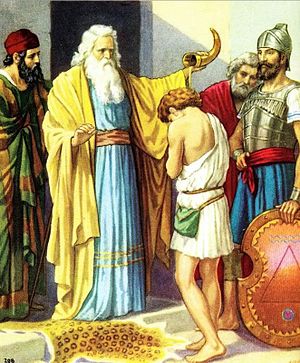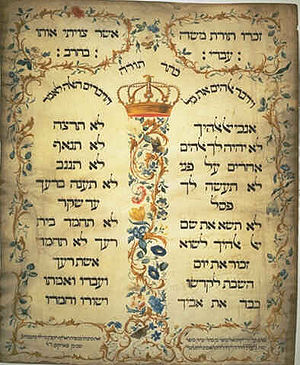 Image via Wikipedia
Image via WikipediaAlmost as many songs and stories have been written about this event as years that have passed since this event. We've all heard the story of a brave boy who defeated a giant. However, today I would like to explore another dimension of this account.
In the preceding chapter, it states that "from that day on, the Spirit of the Lord came upon David in power" (1 Samuel 16:13) when referring to Samuel's anointing of David, the shepherd boy, as King of Israel. David continued in his duties as a shepherd to his father's sheep, but with the Spirit of the Lord dwelling in him, numerous changes were effected in David's spirit. Over time, he grew not only in his knowledge of God but also in his certainty of God's very existence and in the ramifications of that knowledge, i.e. God's covenanted eternal promises to Israel; God's eternal love of Israel; God's specific sovereign plan for his life.
Through the Spirit of the Lord, David came to know and love the Lord who appointed him king.
So, when David arrived at the battleground where the Philistine, Goliath, was taunting Israel's army, I am sure that Spirit of the Lord brought to mind Mosaic writings with which David was familiar. (In Genesis 10:14, where the Philistines were first mentioned, it was to state that they descended from Noah's son Ham, who fathered the Canaanites whom God cursed through all generations, for their brazen dishonor of God. God ordered Israel to dispossess the Canaanites when they entered the Promised Land. )
In the manner in which David questioned Israel's soldiers about the identity of Goliath, he prodded them to recognize Goliath as an "uncircumcised Philistine" thus stating that this formidable giant was already cursed by God and could not successfully stand against the army of the Living God. David's older brothers, and probably other soldiers, were angered when David reminded them of God's view on this battle. Though David was ridiculed for expressing his belief that this physically daunting giant who terrified Israel's army, was really an already defeated foe, cursed by God and only awaiting destruction, he clung to it. David persisted in talking to numerous troops about this so that eventually even King Saul heard of David's pronouncements.
I think that God wanted Israel's army to hear of David's faith in the God of Israel because soon afterwards, King Saul permitted David to battle the Philistine giant, Goliath.
Fortified by his relationship with the God of Abraham, Isaac, and Jacob, David took only five smooth stones and a slingshot to face the giant who was garbed in over a hundred pounds of bronze protective gear (1 Samuel 17: 4-7). When facing the giant who was over nine feet tall and who carried a formidable iron spear, David focused only on the God of Israel, who chose Israel out of all of the nations to be His own; who had a plan for Israel; who Himself effected an eternal covenanted relationship with Israel; who spoke through prophets to Israel; who worked in Israel's midst through signs and wonders. Because the Spirit of the Lord was on David, he stepped out in confidence that no matter how he used the slingshot, God would make certain that it hit its mark.
This battle, in which David first publicly stood on God's Word, was really David's first battle as King of Israel, in which he defended his nation. David began the battle by admonishing his troops to remember who the God of Israel was. And then, after he defeated the Philistine champion, the army of Israel was sufficiently empowered spiritually to pursue and defeat the fleeing Philistine army. David became a leader of his people by encouraging them to turn their hearts back to the living God of Israel.
Unfortunately, King Saul, a seasoned warrior, could only fight the enemy in his own strength. Because he himself rejected the God of Israel, he couldn't encourage his troops to seek Him for the strength they needed. King Saul could not see that the battles Israel fought were lost or won in the heart and spirit of Israel, on the strength of their faith in the God of Abraham, Isaac, and Jacob.
In the preceding chapter, it states that "from that day on, the Spirit of the Lord came upon David in power" (1 Samuel 16:13) when referring to Samuel's anointing of David, the shepherd boy, as King of Israel. David continued in his duties as a shepherd to his father's sheep, but with the Spirit of the Lord dwelling in him, numerous changes were effected in David's spirit. Over time, he grew not only in his knowledge of God but also in his certainty of God's very existence and in the ramifications of that knowledge, i.e. God's covenanted eternal promises to Israel; God's eternal love of Israel; God's specific sovereign plan for his life.
Through the Spirit of the Lord, David came to know and love the Lord who appointed him king.
So, when David arrived at the battleground where the Philistine, Goliath, was taunting Israel's army, I am sure that Spirit of the Lord brought to mind Mosaic writings with which David was familiar. (In Genesis 10:14, where the Philistines were first mentioned, it was to state that they descended from Noah's son Ham, who fathered the Canaanites whom God cursed through all generations, for their brazen dishonor of God. God ordered Israel to dispossess the Canaanites when they entered the Promised Land. )
In the manner in which David questioned Israel's soldiers about the identity of Goliath, he prodded them to recognize Goliath as an "uncircumcised Philistine" thus stating that this formidable giant was already cursed by God and could not successfully stand against the army of the Living God. David's older brothers, and probably other soldiers, were angered when David reminded them of God's view on this battle. Though David was ridiculed for expressing his belief that this physically daunting giant who terrified Israel's army, was really an already defeated foe, cursed by God and only awaiting destruction, he clung to it. David persisted in talking to numerous troops about this so that eventually even King Saul heard of David's pronouncements.
I think that God wanted Israel's army to hear of David's faith in the God of Israel because soon afterwards, King Saul permitted David to battle the Philistine giant, Goliath.
Fortified by his relationship with the God of Abraham, Isaac, and Jacob, David took only five smooth stones and a slingshot to face the giant who was garbed in over a hundred pounds of bronze protective gear (1 Samuel 17: 4-7). When facing the giant who was over nine feet tall and who carried a formidable iron spear, David focused only on the God of Israel, who chose Israel out of all of the nations to be His own; who had a plan for Israel; who Himself effected an eternal covenanted relationship with Israel; who spoke through prophets to Israel; who worked in Israel's midst through signs and wonders. Because the Spirit of the Lord was on David, he stepped out in confidence that no matter how he used the slingshot, God would make certain that it hit its mark.
This battle, in which David first publicly stood on God's Word, was really David's first battle as King of Israel, in which he defended his nation. David began the battle by admonishing his troops to remember who the God of Israel was. And then, after he defeated the Philistine champion, the army of Israel was sufficiently empowered spiritually to pursue and defeat the fleeing Philistine army. David became a leader of his people by encouraging them to turn their hearts back to the living God of Israel.
Unfortunately, King Saul, a seasoned warrior, could only fight the enemy in his own strength. Because he himself rejected the God of Israel, he couldn't encourage his troops to seek Him for the strength they needed. King Saul could not see that the battles Israel fought were lost or won in the heart and spirit of Israel, on the strength of their faith in the God of Abraham, Isaac, and Jacob.






